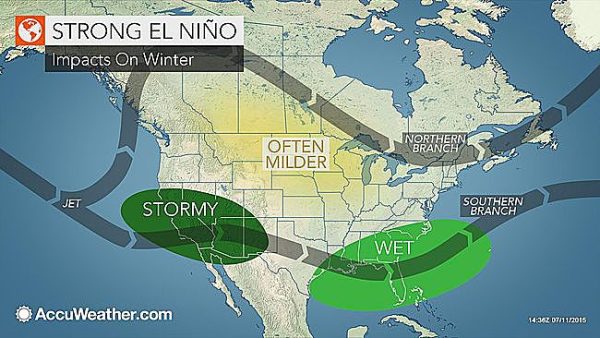Earlier this year, the National Weather Service officially declared the formation of an El Niño in the Eastern Pacific Ocean which could influence North Georgia’s winter.
Scientists at the National Oceanic and Atmospheric Administration (NOAA) predict the climate phenomenon to be of high magnitude, having large effects far beyond the site of the event. These predictions lead climatologists to believe North Georgia will experience above-average precipitation levels tied in with below-average temperatures during the 2023-2024 winter season.
An El Niño describes unusual amounts of warm water collecting in the Pacific Ocean. These warm waters influence the temperature of air currents through a process called upwelling. During this event, the Pacific Air Stream that flows from west to east over the United States dips down, resulting in wetter and colder weather in the southeast. The level of influence El Niño has on the jet stream is placed on a scale from weak to moderate to strong.

When NOAA first announced El Niño at the beginning of June 2023, there was only around a 56% chance of it becoming a strong-level event. The chances have now grown to over 70%, and the event will most likely peak at a strong El Nino this winter. This rise in certainty indicates that El Niño is not going anywhere anytime soon.
El Niño’s effects are much more pronounced during the winter months. This explains why this phenomenon has been formed all summer with no real sign of it affecting the southeastern United States.
A question still arises of how something that has formed thousands of miles away could affect the residents of North Georgia. Jacob Bateman McDonald, Professor of Geography and Geospatial Science at the University of North Georgia contributes this effect to the teleconnection of the Earth’s climate.
“El Niño can affect weather thousands of miles away from where it forms because it is what is known as a teleconnection. This teleconnection strengthens the Hadley circulation cells bringing much stronger flows of air from the tropics to the poles.” – Jacob Bateman McDonald, Professor of Geography and Geospatial Science, UNG Gainesville
This interconnection of air streams is the leading factor as to why Georgia will experience high levels of precipitation and even flooding in certain cases.
Climatologists at NOAA have made it clear that an El Niño event does not directly cause these impacts to occur but rather increases the likelihood that they do. Therefore, the impacts mentioned are only expectations based on past El Niño events and are subject to change.
The effects of this event have been predicted to be prevalent at least until January of next year, possibly even lasting up until March. Residents of North Georgia should be prepared for many cold and rainy days in the coming months.
























